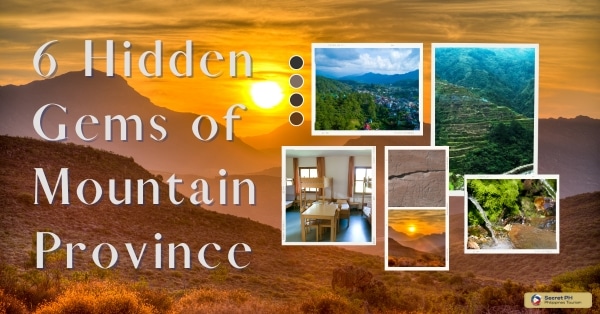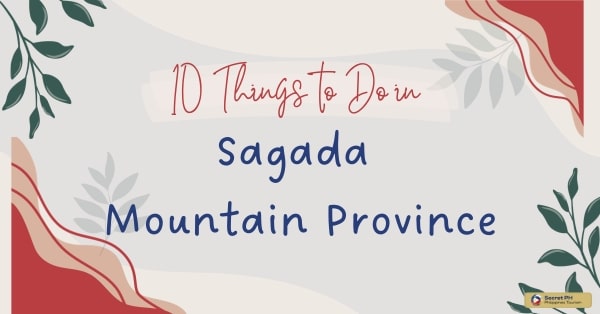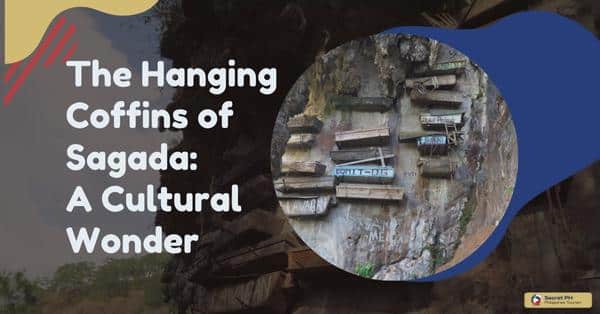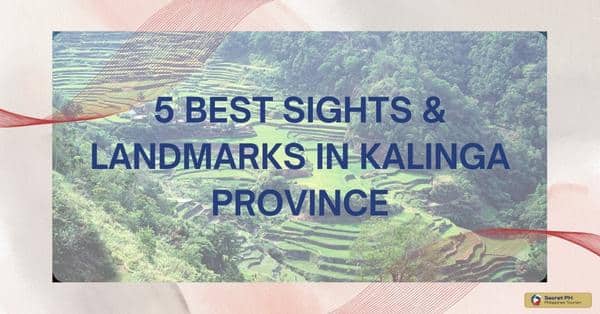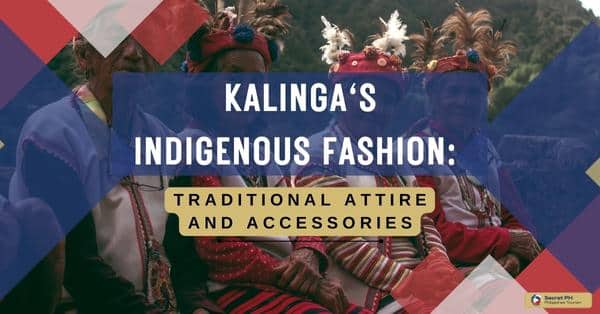The province of Ifugao in the Philippines has been home to many of these traditional ceremonies for centuries, and each one provides a unique insight into its culture. From the Imbayah Festival to Gotad ad Kiangan, Ifugao’s festivals are steeped in rich history and tradition.
In this blog post, we will explore how you can experience the fascinating culture of Ifugao’s traditional festivals. We’ll discuss some tips to make the most of your time, as well as provide an insight into what makes each festival unique and special. So whether you’re looking for a unique cultural experience or simply want to learn more about the culture of Ifugao, read on to discover these incredible festivals!
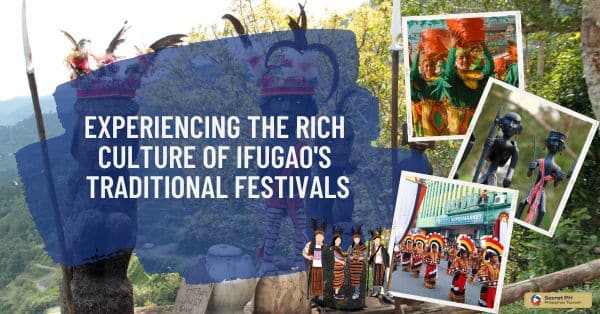
The Ifugao Culture
Nurtured by the lush landscapes of the Philippine Cordilleras, the Ifugao culture stands as a testament to centuries of tradition and connection to the land. Rooted in their reverence for nature, the Ifugao people have crafted a unique way of life that revolves around their intricate rice terraces, which not only sustain them but also serve as a spiritual symbol of their harmonious relationship with the environment.
This indigenous culture is characterized by its oral traditions, weaving, woodwork, and intricate metal craftsmanship, all of which are deeply interwoven with their daily existence and rituals. Through their dances, music, and rituals, the Ifugao people showcase their deep spiritual connection to nature and the ancestral wisdom that guides their existence.
With a strong emphasis on community and shared values, the Ifugao culture exemplifies a way of life that centers around cooperation, self-sufficiency, and the preservation of their rich heritage. The rituals, songs, and stories that define Ifugao life reflect not only their history but also their identity as a people intricately tied to the mountains and terraces that have shaped their existence for generations.
This culture is a living testament to the resilience of the Ifugao people, who continue to honor their traditions while adapting to the modern world, ensuring that their unique way of life remains a source of inspiration and admiration for generations to come.
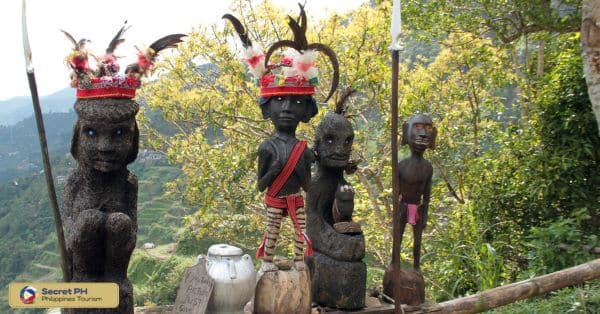
Traditional Festivals in Ifugao
The province’s vibrant festivals are windows into the hearts and souls of the Ifugao people, offering a glimpse into their deep-rooted customs, rituals, and collective identity. These festivals are not merely events; they are vibrant expressions of history, spirituality, and unity, reflecting the essence of Ifugao culture.
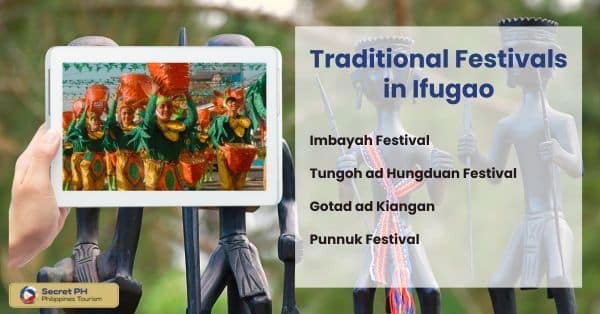
Imbayah Festival
The Imbayah Festival is the largest and most popular of all Ifugao festivals. Held annually in May on Mt. Data, it celebrates the coming together of the different tribes that inhabit the area and their collective identity as Ifugaos. During this festival, groups from various villages take part in traditional dances, processions, rituals, and competitions to honor
The Imbayah Festival stands as a grand testament to the Ifugao people’s deep-rooted traditions and unity. This vibrant celebration, held in Banaue, Ifugao, honors their agricultural heritage, craftsmanship, and spiritual beliefs.
Here are some other things to know about the Imbayah Festival:
- The festival is held at the Banaue Town Plaza.
- The dances, songs, and music are performed by Ifugao tribesmen and women.
- The competitions in rice pounding, bamboo carving, and weaving are open to all participants.
- The wooden scooter race is a test of speed and agility.
- The festival ends with a feast of traditional Ifugao food.
Tungoh ad Hungduan Festival
The Tungoh ad Hungduan Festival is an annual festival in Hungduan, Ifugao, Philippines. It is held in the third week of April to celebrate the end of the rice planting season. The festival features a variety of activities, including a parade of tribes, traditional dances, competitions in ethnic games, and a trade fair. The highlight of the festival is the climb to Mount Napulawan, a sacred mountain for the Ifugao people. The Tungoh ad Hungduan Festival is a celebration of the Ifugao people’s rich culture and their strong connection to the land.
Here are some other things to know about the Tungoh ad Hungduan Festival:
- The festival is held at the Hungduan Municipal Plaza.
- The parade of tribes features traditional Ifugao costumes and dances.
- The ethnic games include tug-of-war, sack race, and bamboo pole climbing.
- The trade fair showcases local products, such as handicrafts, food, and agricultural produce.
- The climb to Mount Napulawan is a challenging but rewarding experience.
Gotad ad Kiangan
The Gotad ad Kiangan Festival is an annual festival in Kiangan, Ifugao, Philippines. It is held in May to celebrate the rich culture and traditions of the Ifugao people. The festival features traditional Ifugao dances, songs, and music. There are also competitions in rice pounding, bamboo carving, and weaving. The highlight of the festival is the gotad, a wrestling tournament between men from different villages. The Gotad ad Kiangan Festival is a celebration of the Ifugao people’s resilience and their strong sense of community.
Here are some other things to know about the Gotad ad Kiangan Festival:
- The festival is held at the Kiangan Municipal Plaza.
- The dances, songs, and music are performed by Ifugao tribesmen and women.
- The competitions in rice pounding, bamboo carving, and weaving are open to all participants.
- The gotad is a test of strength and skill.
- The festival ends with a feast of traditional Ifugao food.
Punnuk Festival
The Punnuk Festival is an annual festival in Hungduan, Ifugao. It is held in August to mark the end of the harvest season. The festival features a tugging ritual called “punnuk”, which is played in the Hapao River. Two teams of men, women, and children pull on a long rope attached to a wooden pole called a “kina-ag”. The team that pulls the kina-ag the farthest wins the tugging ritual. The Punnuk Festival is a celebration of the Ifugao people’s hard work and resilience. It is also a time for them to give thanks to the gods for a bountiful harvest.
Here are some other things to know about the Punnuk Festival:
- The festival is held at the nunhipukana, or the confluence of the Hapao River and its Punnuk tributary.
- The kina-ag is made of bamboo and is decorated with flowers and leaves.
- The pakid is a long wooden pole that is used to hook the kina-ag.
- The tugging ritual is accompanied by traditional Ifugao music and dance.
- The festival ends with a feast of boiled meat and rice.
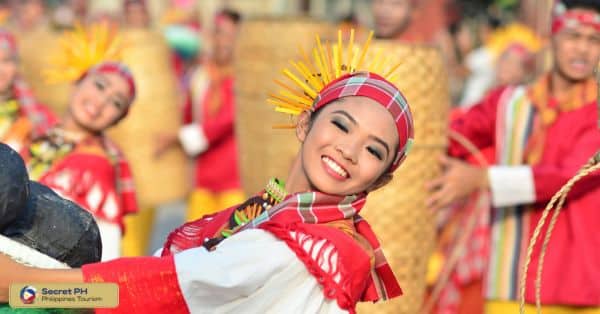
How to Experience Ifugao’s Traditional Festivals
One of the best ways to immerse yourself in the local culture is by experiencing Ifugao’s traditional festivals. These festivals are not only a celebration of the community’s customs and beliefs but also an opportunity to witness colorful parades, intricate rituals, and lively performances. In this section, we will explore how you can fully experience Ifugao’s traditional festivals and create lasting memories.
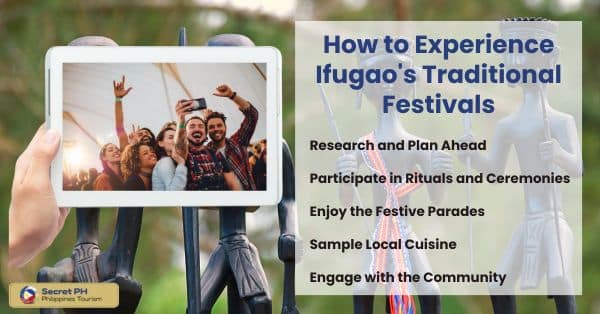
Research and Plan Ahead
Before visiting Ifugao, it’s essential to research the different festivals that take place throughout the year. Some of the most popular festivals in Ifugao include the Imbayah Festival, the Gotad ad Ifugao, and the Hudhud Chants Festival.
Each festival has its unique significance and showcases various aspects of Ifugao culture. By planning ahead, you can align your visit with a festival that interests you the most and maximize your experience.
Participate in Rituals and Ceremonies
One of the highlights of Ifugao festivals is the performance of traditional rituals and ceremonies. These rituals are deeply rooted in the community’s spiritual beliefs and serve as a way to honor ancestors and seek blessings for the future.
During the festivals, you can witness sacred dances, chants, and offerings to the gods. If given the opportunity, don’t hesitate to participate in these rituals under the guidance of the locals. It’s a chance to connect with Ifugao’s cultural heritage on a profound level.
Enjoy the Festive Parades
Ifugao festivals are known for their vibrant parades filled with colorful costumes, traditional music, and lively dances. The streets come alive with performers showcasing their skills and talents.
Make sure to find a good spot along the parade route to capture the spectacle and immerse yourself in the festive atmosphere. You can join the locals in cheering and clapping as the procession passes by, creating a sense of unity and joy.
Sample Local Cuisine
No festival experience is complete without indulging in the local cuisine. Ifugao has a rich culinary heritage, and the festivals provide an excellent opportunity to taste traditional dishes.
From pinikpikan (a native chicken dish) to tinawon rice (Ifugao’s heirloom rice), there are plenty of delicacies to explore. Head to the food stalls and try out the different offerings prepared by local cooks. The flavors and aromas will transport you to the heart of Ifugao’s gastronomic traditions.
Engage with the Community
One of the most rewarding aspects of attending Ifugao’s traditional festivals is the chance to connect with the local community. Take the time to interact with the festival-goers, artisans, and performers.
Learn about their customs, traditions, and stories behind the festival celebrations. Whether it’s engaging in conversations, purchasing handicrafts, or participating in cultural workshops, building connections with the locals will enhance your overall experience and create lasting memories.

Tips for Experiencing Ifugao’s Traditional Festivals
Engaging with Ifugao’s traditional festivals is a journey into a world of age-old customs, vibrant rituals, and deep-rooted unity. To make the most of your experience and ensure a meaningful connection with the community, consider these valuable tips that will enhance your journey through the cultural richness of the Philippine Cordilleras.
- Plan your trip in advance. The most popular festivals are held during the peak tourist season, so it is important to book your accommodation and transportation in advance.
- Learn about the Ifugao culture. Before you go, take some time to learn about the Ifugao people and their culture. This will help you appreciate the festivals even more.
- Dress appropriately. When attending a traditional Ifugao festival, it is important to dress respectfully. This means covering your shoulders and knees.
- Be respectful of the Ifugao people. Remember that these festivals are important cultural events for the Ifugao people. Be respectful of their customs and traditions.
- Be open-minded. Ifugao culture is very different from Western culture. Be open to new experiences and be willing to learn about a different way of life.
- Have fun! Ifugao’s traditional festivals are a great way to experience the rich culture and traditions of the Ifugao people. Soak up the atmosphere, enjoy the performances, and have fun!
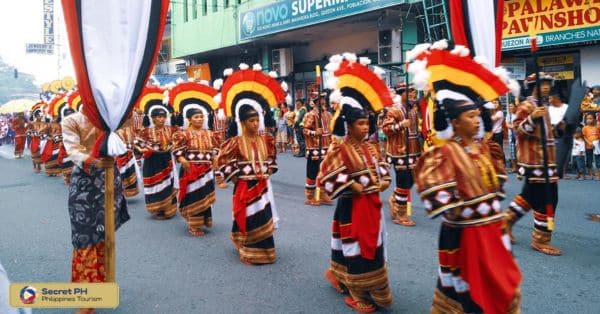
In conclusion
The Ifugao traditional festivals are an awe-inspiring way to experience the vibrant culture and deep-rooted traditions of this unique indigenous community. From honoring their agricultural heritage to celebrating their resilience, these festivals provide a window into the heart and soul of the Ifugao people. By taking part in rituals, engaging with the locals, and sampling local cuisine, you can explore the rich cultural heritage of this proud community and create lasting memories.

